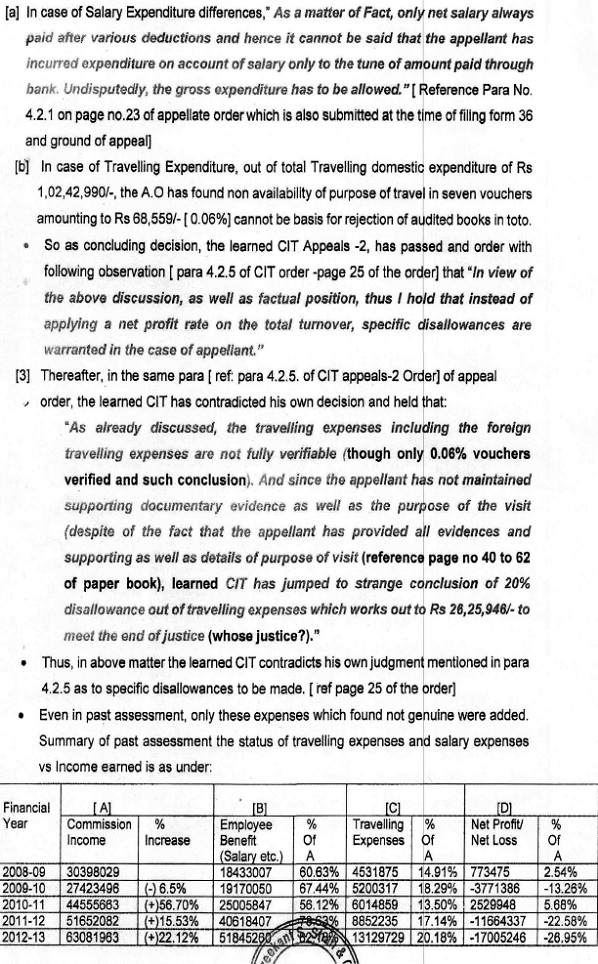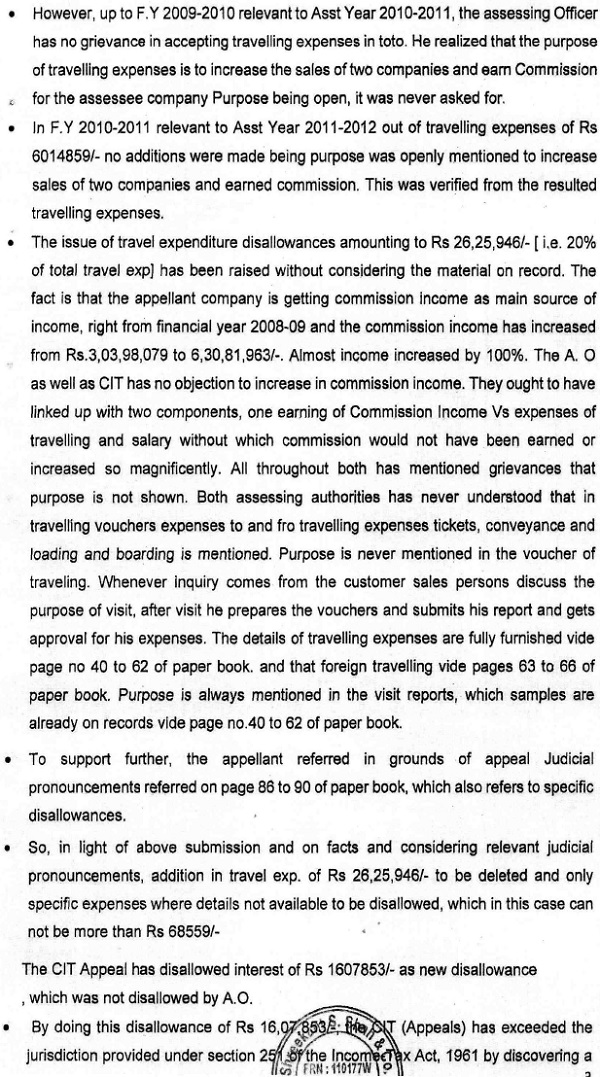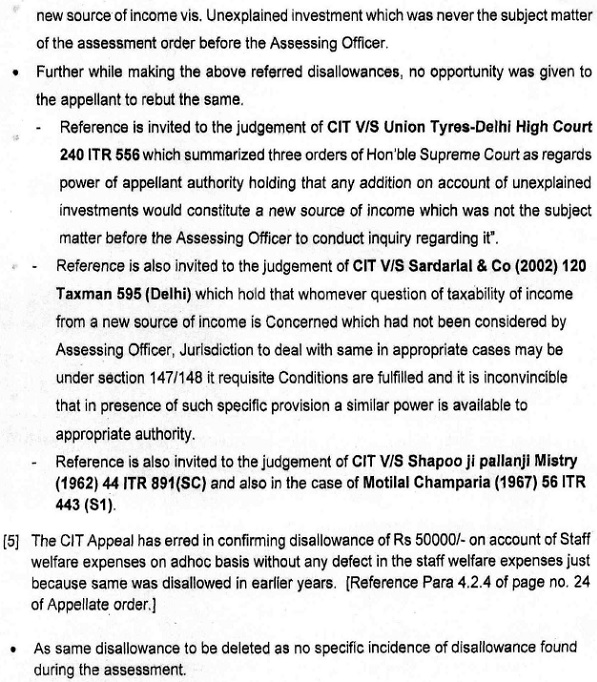Case Law Details
Rotex Enterprises P. Ltd. Vs DCIT (ITAT Ahmedabad)
The Income Tax Appellate Tribunal (ITAT) Ahmedabad recently adjudicated a case concerning the powers of the Commissioner of Income Tax (Appeals) [CIT(A)] to expand the scope of assessment beyond what was considered by the Assessing Officer (AO). In the case of Rotex Enterprises P. Ltd. vs DCIT, the tribunal emphasized that while the CIT(A) has wide-ranging powers to revise assessments, including the authority to correct the AO on various matters, these powers do not extend to discovering new sources of income.
Relevant Section: The tribunal referenced Section 251 of the Income Tax Act, 1961, which delineates the powers of the CIT(A) in the appellate process. Section 251 provides the CIT(A) with the authority to enhance assessments and revise various aspects of the assessment process. However, this authority is not absolute and is subject to certain limitations, particularly regarding the scope of the assessment.
Judicial Precedents: The tribunal relied on several judicial precedents to support its interpretation of the CIT(A)’s powers:
- CIT vs. Shapoorji Pallonji Mistry (1962) 53 ITR 225 (SC): The Hon’ble Supreme Court held that while the CIT(A) has broad powers to revise assessments, these powers do not extend to discovering new sources of income.
- Commissioner of Income Tax vs. Union Tyres (Del) 240 ITR 556: The Hon’ble Delhi High Court reiterated the principle that the CIT(A) cannot expand the scope of assessment to include new sources of income.
- CIT vs. Scindia Steam Navigation Co. Ltd. (1971) 80 ITR 589 (Bom): The Hon’ble Bombay High Court further affirmed that the CIT(A) cannot discover new sources of income beyond what was considered by the AO.
Case Overview: During the assessment proceedings, the AO rejected the books of accounts of Rotex Enterprises P. Ltd. and estimated the income at 10% of the turnover due to unverifiable travelling expenses and discrepancies in salary payments. In the appeal before the CIT(A), specific disallowances were made without explicitly addressing the rejection of the books of accounts or providing the assessee with an opportunity to respond.
Tribunal’s Ruling: The ITAT Ahmedabad, after carefully considering the arguments presented, concluded that the disallowances made by the CIT(A) were beyond his powers. The tribunal emphasized that the CIT(A) cannot expand the scope of assessment to discover new sources of income and must adhere to the principles of natural justice.
Conclusion: The judgment in Rotex Enterprises P. Ltd. vs DCIT reinforces the principle that the CIT(A) cannot discover new sources of income beyond what was considered by the AO. It underscores the importance of procedural fairness and adherence to legal principles in the appellate process. This ruling provides clarity on the extent of the CIT(A)’s authority and serves as a guide for future appellate proceedings in income tax cases.
FULL TEXT OF THE ORDER OF ITAT AHMEDABAD
Present appeal has been filed by the assessee against order passed by the ld.Commissioner of Income Tax(A)-2, Vadodara [hereinafter referred to as “Ld.CIT(A)”]dated 6.6.2017 passed under section 250(6) of the Income Tax Act, 1961 [hereinafter referred to as “the Act” for short]for the Asst. Year 2013-14.
2. The grounds raised in the appeal are as under:
i) The order of the Commissioner of Income-Tax (Appeals)-ll (hereinafter referred to as Commissioner Appeals) is bad in law and erroneous as to facts inasmuch as he has exceeded the jurisdiction provided under section 251 of the Income-Tax Act, 1961 by discovering a new source of income viz. unexplained investment which was never the subject matter of the assessment before the Assessing Officer. In other words, the direction of the order of the Appellate Assistant Commissioner was to satisfy himself about the source of investment of the assets. It is axiomatic that failure to prove the sources of investment will result in addition in the hands of assessee under a different provision of law and will not have much relevance in disallowance of interest income, travelling expenses and staff welfare expenses on ad-hoc basis.
ii) The Commissioner Appeals ought to have followed the ratio laid down by Hon’ble Delhi Court in the case of Commissioner of Income Tax vs. Union Tyres – Delhi High Court 240 ITR 556 which summarized three orders of the Hon’ble Supreme Court as regards power of appellant authority holding that any addition on account of unexplained investments would constitute a new source of income which was not the subject matter before the Assessing Officer and therefore, it was not open to the first appellate authority to direct Assessing Officer to conduct enquiry regarding it.
iii) The Commissioner Appeals also ought to have followed judgment of Hon’ble Delhi High Court in the case of CIT vs. Sardarilal& Co. (2002) 120 Taxman 595 (Delhi) which held that whenever question of taxability of income from a new source of income is concerned which had not been considered by Assessing Officer, jurisdiction to deal with same in appropriate cases may be dealt with under section 147/148 if requisite conditions are fulfilled and it is inconceivable that in presence of such specific provision a similar power is available to first appropriate authority.
iv) The Commissioner Appeals ought to have followed the judgment qf Hon’ble Supreme Court in the case of CIT vs. Shapoorji Pallonji Mistry (1962) 44 ITR 891 (SC) and also judgment of Hon’ble Supreme Court in the case of CIT vs. RaibahadurHardutrai Motilal Chamaria (1967) 56 ITR 443 (SC).
v) Without prejudice to the above, it is submitted that the Commissioner Appeals ought to have quashed the assessment order passed by Deputy Commissioner of Income-Tax, Circle-2(l), Vadodara as same is passed taking recourse of section 145(3) based on incorrect appreciation of facts on record and estimating income at 10% of the turnover by resorting to section 144 of the Act.
vi) The Commissioner Appeals erred in disallowing 20% of the travelling expenses of Rs.26,25,946/- on ad-hoc basis when the Deputy Commissioner of Income-Tax has verified only 0.6% of the total travelling expenses which comes to Rs.68,559/- ignoring the past assessments in which disallowances were made to the extent of distinctively identified and not satisfied with the evidences.
vii) The Commissioner Appeals has wrongly disallowed interest of 16,07,853/- on borrowed funds, taking recourse to new source of income which was not being subject matter of the assessment before the Assessing Officer without giving opportunity to explain the same.
viii) The Commissioner Appeals erred in disallowing Rs.50,000/- on account of staff welfare expenses on ad hoc basis without pointing out any defect in expenses. the staff welfare.
ix) The appellant company prays to quash the order of Appellate Assistant Commissioner of Income-Tax u/s.251 of the Income-Tax and cancel the specific disallowances/ additions made by the Assessing Officer in computing total income of the assessee.
x) The appellant company craves for leave to add, alter, amend or substitute any ground before final hearing.”
3. The assessee has raised as many as ten grounds in the appeal They are not in consonance with the Rule 8 of the Income Tax (Appellate Tribunal) Rules, 1963, and are a blend of descriptive and argumentative contents. In fact, a perusal of these grounds demonstrate that the assessee is aggrieved by the action of the Revenue in disallowing (i) travelling expenses of Rs.26,25,945/-; (ii) disallowance of interest expenses of Rs. 16,07,853/- on borrowed funds, and (iii) disallowance of Rs.50,000/- on account of staff-welfare expenses. Therefore, we proceed to adjudicate the effective issues raised by the assessee hereinafter.
4. Brief facts of the case are that during assessment proceedings, the AO noted the assessee to be in the business of being a commission agent. On scrutiny of the books of accounts of the assessee he noted anomalies therein pertaining to the travelling expenses, which he found were not duly evidenced with regard to their business purpose, and with respect to salary expenses whichhe noted differed from the amount paid by the assessee through banking channel as compared to that claimed by the assessee in its books of accounts. Noting these anomalies, along with the fact that the assessee though being a marketing company having only sale commission income as its main income, it was incurring losses, which was not possible he therefore held that audited books of accounts of the assessee were not reliable and accordingly rejected the same in terms of provisions of section 145(3) of the Act. After rejecting the books of accounts, he applied a net profit of 10% of the turnover of the company for the purpose of assessing the taxable income.
5. Aggrieved by the same, the assessee went in appeal before the CIT(A) who after considering the facts of the case before him and the pleadings made by the assessee, held that it was not a case for application of GP rate, but specific disallowance was to be made. He found no anamoly in the claim of salary expenses, and vis-à-vis travelling expenses, though he agreed with the AO that their business purpose was not establishedhe went on to make an adhoc disallowance of 20% of the same. Further, the ld.CIT(A) noted that the assessee had no capital of its own, and in fact a negative capital; that it had taken huge interest bearing funds, and deployed in working in progress, which he found did not relate to the business of the assessee. Accordingly he disallowed 12% of the interest expenses claimed by the assessee in relation to the funds allegedly deployed in the WIP of the assessee. The ld.CIT(A) also made disallowance of staff welfare expenses on an adhoc basis of 10% of the same amounting to Rs.50,000/-. Accordingly, the ld.CIT(A) deleted the assessment made by the AO of the net profit of the assessee at the rate of 10% of its turnover, and in turn directed specific disallowance to be made of interest expenses, staff welfare expenses and foreign travelling expenses as noted by us.
6. Aggrieved by the same, the assessee has come up in appeal before the Tribunal raising the grounds reproduced above.
17. Before us, primary and solitary contention of the ld.counsel for the assessee was that the order of the ld.CIT(A) was not sustainable for the reasons –
i) That the Ld.CIT(A) had not given any finding dismissing AO’s rejection of Books of the assessee and without doing so had gone on to suo moto make disallowance of specific
ii) That the ld.CIT(A) went on to make disallowance of interest and staff welfare expenses which were not even within the radar of the assessment of the AO, and which was not even confronted to the assessee during the appellate proceedings;
iii) That in terms of provisions of section 251 of the Act, which enshrined the powers of the ld.CIT(A) to expand the scope of the assessment, the ld.CIT(A)could not have exceeded the jurisdictionof the AO and dealt with issues which were completely untouched by the AO. He relied upon the following decisions in this regard –
a) CIT Vs. Union Tyres, 240 ITR 556 (Del)
b) CIT Vs. Sardarlal& Co., (2002) 120 taxman 595 (Del)
c) CIT Vs. Shapoo ji Pallanji Mistry, (1962) 44 ITR 891(SC);
d) Motilal Champaria (1967) 56 ITR 443 (SC)
8. The assessee also pleaded that while making specific disallowance of interest expenses and staff welfare expenses, the assessee was not even confronted with the same, and therefore, the disallowance were made in violation of principle of natural justice.
The submissions in this regard in writing were filed before us as under:




9. We have heard contentions of both the parties, and we have carefully gone through the orders of the authorities below.
As emanates from the record, and as pointed to us during the course of hearing, the AO had rejected the books of accounts of the assessee and estimated the income of the assessee by applying 10% to the gross turnover of the assessee. His reasons for rejecting the books of accounts of the assessee were –
i) Unverifiable and un-evidenced travelling expenses;
ii) Mismatch in salary as paid through bank and claimed in the books of accounts;
iii) His general observation that the assessee being in the marketing business, earning commission income alone, it was showing loss which was not probably in this line of
10. As pointed out by the ld.counsel for the assessee, the ld.CIT(A) did not find any merit in the anomaly of salary mismatch between that reflected in the bank and that claimed by the assessee in its books as noted by the AO. But however, he concurred with the AO on the non-verifiability of travelling expenses. Having said so, we have noted that the ld.CIT(A) thereafter went onto hold that in the facts of the present case specific disallowances were to be made and gross profit rate was not to be applied. Impliedly, he has dismissed the rejection of the books of accounts by the assessee, holding them to be correct.
11. Going forward from here, the ld.CIT(A) went to make specific disallowance himself by adopting an ad hoc approach for the same that too without confronting the assessee on the disallowance of staff welfare expenses, interest expenses and on the disallowance of travelling expenses.
12. On the aspect of travelling expenses, the assessee had time and again reiterated that the AO had examined only 0.6% of the total expenses, and found them to be unverifiable. But that the ld.CIT(A) without giving any reason for not agreeing with the assessee’s contention, went on to summarily hold that 20% of the expenses are to be disallowed, that too without giving any opportunity of hearing to the assessee before doing so.
13. Similarly, the staff welfare expenses were also disallowed to the tune of 10% of the same, without even giving an opportunity to the assessee or confronting the same to the assessee. In the same manner, theld.CIT(A) has made disallowance of interest expenses on WIP without confronting the same to the assessee.
Clearly, the order passed by the ld.CIT(A) is in gross violation of the principles of natural justice and the additions made by him are not sustainable for this reason alone.
As for the arguments of the ld.counsel for the assessee that disallowance of staff welfare expenses and interest expenses was beyond the power of the ld.CIT(A), we find merit in the same. Though section 251 of the Act gives power to the ld.CIT(A) to expand scope of the assessment made, but the Hon’ble Supreme Court in various decisions has held that the scope cannot be expanded to discover new source of income. While explaining the wide scope of powers conferred on the first appellate authority by section 251 of the Act so as to include even enhancement of assessments, courts have held that they are not ordinary courts of appeals since only one party to the original decision is entitled to appeal and not the other party. That in view of this peculiar position the statute has conferred very wide powers on the first appellate authority once an appeal is preferred to him. That accordingly once an assessment comes before the first appellate authority, his competence is not restricted to examining those aspects of the assessment which are complained of by the assessee, but ranges over the whole assessment and it is open to him to correct the Assessing Officer not only with regard to matter raised in appeal but also with regard to all matters considered by the AO . He can revise every process which led to the ultimate computation or assessment. But this power cannot extend to the Ld.CIT(A) discovering new sources of income. The Hon’ble apex court laid down this law in CIT vs Shapoorji Pallonji Mistry (1962) 53 ITR 225(SC) which was followed by the Hon’ble Bombay High Court in the case of Commissioner of Income Tax vs Union Tyres 240 ITR 556 (Del) and by the Hon’ble Bombay High Court in the case of CIT vs Scindia Steam Navigation Co. Ltd. (1971) 80 ITR 589 (Bom).
In view of the same, we hold, that the disallowance made with respect to the staff welfare expenses and interest expenses, is not sustainable in law being beyond power of the ld.CIT(A). The same is directed to be deleted.
In view of the above all the disallowances made by the Ld.CIT(A) are directed to be deleted.
15. In the result, the appeal of the assessee is allowed.
Order pronounced in the Court on 24th January, 2024 at Ahmedabad.





